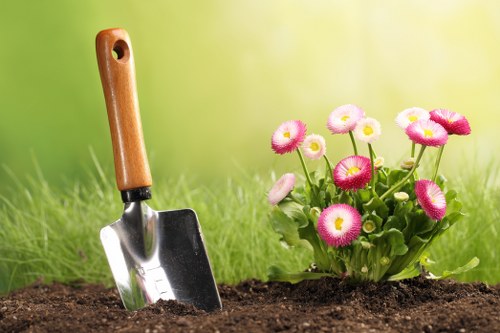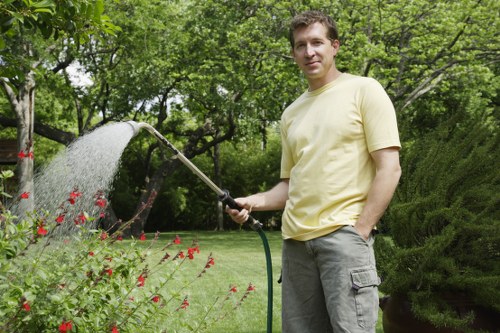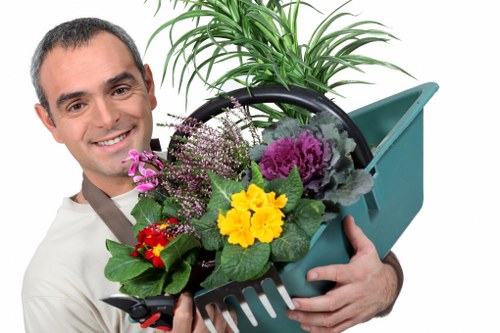Transform Your Outdoor Space with Landscape Gardening in Forest Hill

Welcome to the world of landscape gardening in Forest Hill, where the lush greenery of the region meets innovative design to create stunning outdoor spaces. Whether you're looking to revamp your backyard, create a serene garden retreat, or enhance your property's curb appeal, landscape gardening offers endless possibilities.
Forest Hill's unique climate and soil conditions provide an excellent foundation for a variety of plants and design elements. By understanding the local environment and incorporating sustainable practices, you can achieve a beautiful and eco-friendly garden that thrives year-round.
In this comprehensive guide, we'll explore the essentials of landscape gardening, including design principles, plant selection, maintenance tips, and the latest trends in Forest Hill. Let's embark on a journey to transform your outdoor space into a personalized paradise.
Understanding the Basics of Landscape Gardening

Landscape gardening is more than just planting flowers and shrubs; it's about creating a harmonious balance between nature and design. In Forest Hill, successful landscape gardening involves careful planning and execution to ensure that your garden not only looks beautiful but also functions well.
Key components of landscape gardening include:
- Design: The overall layout and aesthetic of your garden.
- Plant Selection: Choosing the right plants that thrive in Forest Hill's climate.
- Hardscaping: Incorporating non-living elements like pathways, patios, and water features.
- Maintenance: Regular care to keep your garden healthy and vibrant.
By focusing on these elements, you can create a landscape that is both visually appealing and sustainable.
Design Principles for a Stunning Garden

Effective landscape design begins with understanding the principles that govern aesthetic appeal and functionality. In Forest Hill, it's important to consider the local environment, including sunlight patterns, rainfall, and native flora.
1. Balance and Symmetry
Achieving balance involves distributing visual weight evenly throughout your garden. Symmetrical designs offer a classic look, while asymmetrical layouts can create a more dynamic and natural appearance.
2. Focal Points
Focal points, such as a stunning tree, a water feature, or a unique sculpture, draw the eye and provide structure to your garden. These elements add interest and guide visitors through the space.
3. Unity and Harmony
Ensuring that all elements of your garden work together creates a sense of unity and harmony. This can be achieved through consistent color schemes, complementary plant varieties, and cohesive hardscaping materials.
Choosing the Right Plants for Forest Hill

Plant selection is crucial for the success of your landscape garden. Forest Hill's temperate climate supports a wide range of plants, from vibrant perennials to evergreen shrubs.
Native Plants
Incorporating native plants into your garden not only enhances its natural beauty but also supports local wildlife and reduces maintenance requirements. Some popular native plants in Forest Hill include:
- Lavender
- Hostas
- Hydrangeas
- Japanese Maple
These plants are well-adapted to the local soil and climate, ensuring they thrive with minimal intervention.
Drought-Tolerant Varieties
With increasing concerns about water conservation, drought-tolerant plants are becoming a popular choice in landscape gardening. Succulents, ornamental grasses, and certain shrub species can maintain beauty without excessive watering.
Incorporating Hardscaping Elements

Hardscaping plays a significant role in defining the structure and functionality of your garden. In Forest Hill, elements like stone pathways, wooden decks, and water features can add both beauty and practicality.
Pathways and Walkways
Stone or gravel pathways guide visitors through your garden, creating a sense of journey and discovery. They can also provide access to different areas, making your outdoor space more navigable.
Patios and Decks
Outdoor living spaces such as patios and decks provide areas for relaxation and entertainment. These structures can be customized with seating, lighting, and outdoor kitchens to suit your lifestyle.
Water Features
Adding water elements like fountains, ponds, or waterfalls introduces the soothing sounds of flowing water and can attract birds and other wildlife to your garden.
Maintenance Tips for a Thriving Garden
Maintaining your landscape garden is essential to ensure its longevity and beauty. Regular care involves watering, pruning, fertilizing, and pest management.
Here are some essential maintenance tips:
- Watering: Ensure plants receive adequate moisture, especially during dry spells.
- Pruning: Regular pruning helps maintain plant shape and removes dead or diseased branches.
- Fertilizing: Providing essential nutrients promotes healthy growth and vibrant blooms.
- Pest Control: Monitor for pests and diseases, and take appropriate measures to protect your plants.
Implementing these practices will keep your garden in prime condition throughout the year.
Latest Trends in Landscape Gardening
The world of landscape gardening is ever-evolving, with new trends emerging to enhance outdoor spaces. In Forest Hill, homeowners are embracing innovative ideas to stay ahead.
Sustainable Practices
Sustainability is at the forefront of modern landscape gardening. This includes using native plants, reducing water usage, and incorporating eco-friendly materials.
Outdoor Living Spaces
Creating functional outdoor living areas, such as kitchens, lounges, and dining spaces, allows for year-round enjoyment of your garden.
Edible Gardens
Integrating vegetables, herbs, and fruit trees into your landscape not only provides fresh produce but also adds a unique dimension to your garden design.
Benefits of Professional Landscape Gardening Services
While DIY gardening can be rewarding, professional landscape gardening services offer expertise and resources to take your garden to the next level. In Forest Hill, professional landscapers understand the local environment and can tailor designs to meet your specific needs.
Advantages of hiring professionals include:
- Expert Design: Customized plans that reflect your vision and complement your property.
- Quality Installation: Skilled execution ensures durable and aesthetically pleasing results.
- Ongoing Maintenance: Regular care to keep your garden thriving and beautiful.
Investing in professional services can save you time and ensure a high-quality landscape that enhances your outdoor living experience.
Planning Your Landscape Garden
Effective planning is the foundation of successful landscape gardening. Start by assessing your outdoor space, understanding your needs, and setting a budget.
Assessing Your Space
Evaluate the size, shape, and existing features of your property. Consider factors like sunlight exposure, soil quality, and drainage patterns.
Setting Goals
Determine what you want to achieve with your garden. Whether it's creating a peaceful retreat, entertaining space, or a garden that attracts wildlife, clear goals will guide your design choices.
Budgeting
Establish a budget that covers design, materials, plants, and labor. Allocating funds appropriately ensures that your project stays on track and meets your expectations.
Selecting the Right Materials
Choosing the right materials is crucial for both the functionality and aesthetics of your landscape garden. In Forest Hill, consider materials that complement the natural surroundings and are durable against the local climate.
Hardscaping Materials
Options include natural stone, brick, concrete, and wood. Each material offers unique textures and colors that can enhance your garden's design.
Sustainable Options
Eco-friendly materials, such as recycled composites and locally sourced stone, support sustainability and reduce your garden's environmental footprint.
Finishing Touches
Incorporate decorative elements like mulch, gravel, and decorative stones to add variety and polish to your landscape.
Seasonal Considerations in Forest Hill
Forest Hill experiences distinct seasons, each bringing its own set of challenges and opportunities for landscape gardening.
Spring
Spring is ideal for planting new vegetation and preparing your garden for the growing season. Focus on soil preparation, fertilization, and planting hardy perennials.
Summer
During the summer, ensure adequate watering and provide shade for sensitive plants. This is also a great time to add vibrant annuals for color.
Autumn
Autumn involves cleaning up garden beds, mulching, and planting bulbs for spring bloom. It's also a time to prune trees and shrubs.
Winter
Winter maintenance includes protecting plants from frost, removing fallen leaves, and planning for the next gardening season.
Enhancing Curb Appeal with Landscape Gardening
Your garden is a reflection of your personal style and plays a significant role in your property's curb appeal. In Forest Hill, strategic landscape gardening can make a lasting impression on visitors and passersby.
Entryways
Design eye-catching entryways with pathways, lighting, and attractive plantings. This sets the tone for the rest of your garden.
Front Yard Features
Incorporate features like flower beds, ornamental trees, and decorative garden structures to create a welcoming and picturesque front yard.
Lighting
Proper lighting enhances the beauty of your garden at night and adds safety. Use a combination of pathway lights, spotlights, and ambient lighting.
Integrating Technology in Landscape Gardening
Modern technology offers innovative solutions to enhance and maintain your landscape garden. From smart irrigation systems to landscape design software, technology can streamline the gardening process.
Smart Irrigation
Automated irrigation systems ensure that your plants receive the right amount of water, conserving resources and reducing manual labor.
Landscape Lighting
Smart lighting systems allow you to control your garden's illumination remotely, creating various moods and enhancing security.
Design Software
Advanced design tools enable you to visualize your garden layout, experiment with different elements, and plan effectively before implementation.
Creating a Wildlife-Friendly Garden
A wildlife-friendly garden supports local fauna and creates a balanced ecosystem. In Forest Hill, incorporating elements that attract birds, butterflies, and beneficial insects can enhance the biodiversity of your garden.
Native Plants
As mentioned earlier, native plants provide essential habitat and food sources for local wildlife.
Water Sources
Adding birdbaths, ponds, or small water features can attract various species and provide necessary hydration.
Shelter and Nesting Sites
Provide shelters such as birdhouses, bee hotels, and dense shrubbery to offer protection and nesting opportunities for animals.
Conclusion: Embrace the Beauty of Landscape Gardening in Forest Hill
Landscape gardening in Forest Hill is an enriching endeavor that combines creativity, sustainability, and a deep appreciation for nature. By following the principles outlined in this guide, you can create a garden that not only enhances your property's beauty but also provides a peaceful sanctuary for you and your family.
Whether you're a seasoned gardener or a beginner, investing time and effort into your landscape garden will yield rewards that go beyond aesthetics. Embrace the transformative power of landscape gardening and watch your outdoor space flourish.
Ready to transform your outdoor space? Contact us today to start your landscape gardening journey in Forest Hill.
